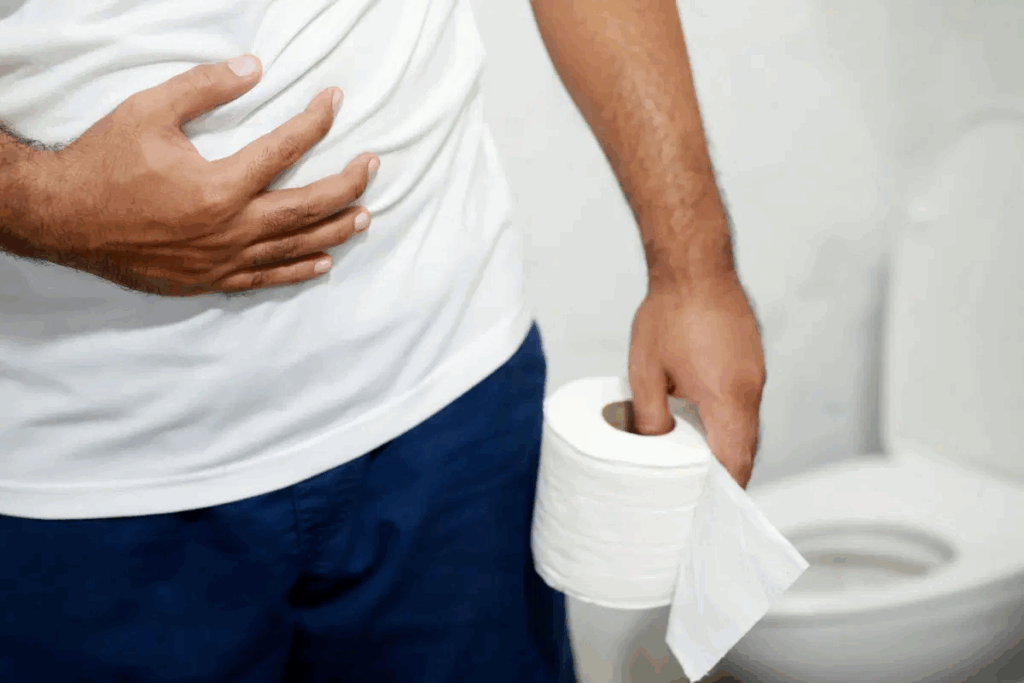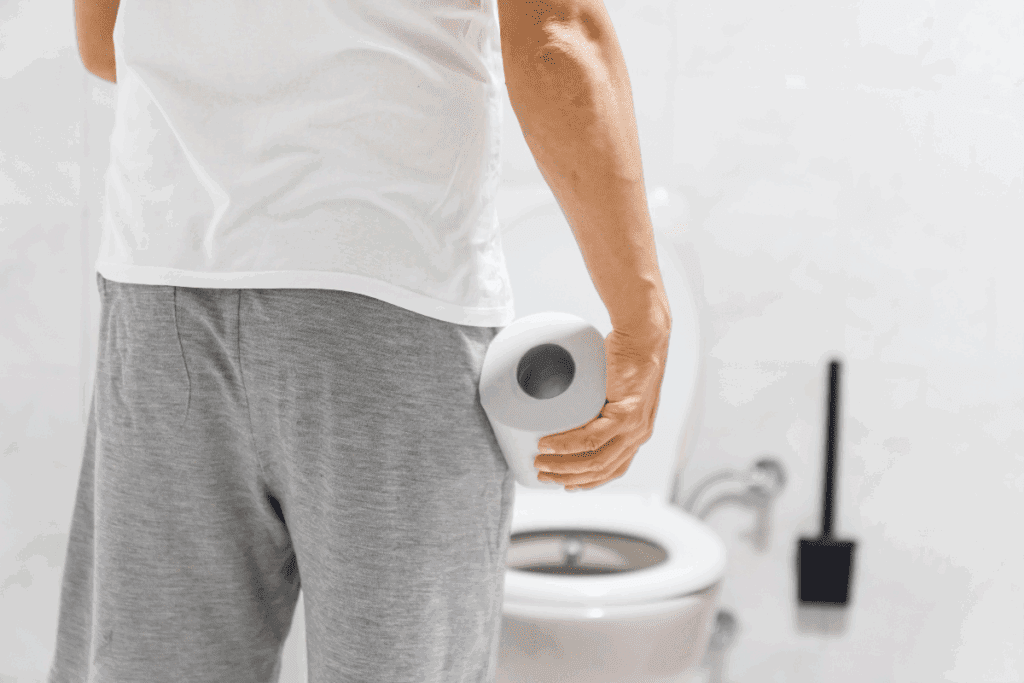
Men over 50 often face urinary and bowel issues. They might wonder if these problems are linked. Benign prostatic hyperplasia (BPH), or enlarged prostate, mainly affects urination. Yet, research shows it can also lead to constipation in some men. Is there a link between enlarged prostate and constipation? Learn how BPH can potentially affect bowel function due to anatomical proximity.
At Liv Hospital, we understand the complex link between these symptoms. Our focus is on caring for men with both urinary and bowel problems. We aim to provide complete care.

Men need to know about Benign Prostatic Hyperplasia (BPH) as they get older. It’s a common issue that can really affect their life quality. BPH is when the prostate gland grows too big, which happens to many men over 50.
An enlarged prostate, or BPH, happens when the prostate gland gets bigger. This can block the urethra and make it hard to pee. It’s not cancer but can make peeing uncomfortable.
The prostate is around the urethra, which carries urine out of the body. When it gets bigger, it can narrow the urethra. This leads to problems with peeing.
BPH is common in older men. More than half of men over 50 have it. Risk factors include getting older, family history, and lifestyle choices.
The exact reason for BPH isn’t known, but hormones play a part. Testosterone and estrogen help the prostate grow. Knowing this can help men prevent it and treat it early if they start to show symptoms.
The symptoms of BPH vary but often include needing to pee a lot, feeling urgent, and having a weak stream. These happen because the prostate blocks the urine flow. This makes it hard to fully empty the bladder.
Some men might pee off and on or feel like they didn’t pee all the way. Spotting these signs early can help men get the right treatment and manage their condition better.

To understand how an enlarged prostate might cause constipation, we need to know the basics of bowel function. Normal bowel movements are key to our health. Knowing what’s normal helps us spot problems.
What’s normal for bowel movements varies from person to person. Generally, it means passing stools that are not too hard or too loose. A healthy bowel habit is:
Keeping normal bowel function is vital to avoid discomfort and serious health problems. Diet, hydration, and physical activity are key to bowel health.
Constipation is a common issue marked by infrequent bowel movements or trouble passing stools. It can be very uncomfortable. Symptoms include:
Defining constipation means knowing its symptoms and how it affects bowel habits. It’s not just about how often you go. It’s also about how easy it is to pass stools.
Many things can lead to constipation, including:
Knowing the causes of constipation is key to managing and preventing it. Making lifestyle changes and adjusting your diet can help.
Understanding bowel function basics and constipation causes helps us see how an enlarged prostate affects bowel habits. This knowledge is vital for managing symptoms and improving life quality.
It’s important to know how the prostate and bowel are connected. This helps us see how an enlarged prostate can mess with bowel movements. The prostate is below the bladder and in front of the rectum, which is part of the large intestine.
The prostate gland is very close to the rectum. They are separated by just a thin layer of tissue. This closeness means they can affect each other’s functions.
The prostate and bowel work together because of their shared space and the pelvic floor muscles. The pelvic floor muscles are key. They support both the prostate and the rectum, affecting how they work.
The pelvic floor muscles are vital for both the urinary and bowel systems. They help control urine and feces flow. If they don’t work right, it can cause problems like constipation or losing urine.
| Anatomical Structure | Function | Impact on Bowel Movement |
| Prostate Gland | Produces seminal fluid | Enlargement can press on the rectum |
| Rectum | Stores feces before elimination | Can be compressed by an enlarged prostate |
| Pelvic Floor Muscles | Supports prostate and rectum | Dysfunction can lead to bowel issues |
Knowing how the prostate and bowel are connected helps us understand constipation and other bowel problems caused by an enlarged prostate. This shows why we should look at both urinary and bowel symptoms when dealing with prostate issues.
The link between an enlarged prostate and constipation is clear. Studies show that these two conditions are closely related. Changes in the prostate can affect how we go to the bathroom.
An enlarged prostate can press on the rectum, causing constipation. This happens because the prostate gets bigger and puts pressure on the rectum. This pressure can make it hard to pass stool, leading to constipation.
The prostate is close to the rectum. It’s located below the bladder and in front of the rectum. This close location means it can easily affect the rectum when it grows.
Many studies have looked into the connection between BPH and constipation. They found that men with BPH are more likely to have constipation. For example, a study in the Journal of Urology showed a strong link between BPH symptoms and constipation.
The reasons for this link are complex. It’s not just about the mechanical pressure. Other factors and shared causes also play a role.
Research shows a strong link between BPH and bowel problems, including constipation. As men get older and BPH becomes more common, so do bowel issues. This highlights the need to look at prostate health for overall gut health.
Understanding the link between an enlarged prostate and constipation helps doctors treat men better. They can now address both urinary and bowel problems caused by BPH.
BPH is mainly linked to urinary problems. But, it can also affect other body functions, like bowel movements. The connection between BPH and bowel function is complex, with many indirect paths.
One way BPH affects bowel movements is through bladder distention. When the prostate grows, it can block urine flow. This causes the bladder to stretch and put pressure on the rectum.
A study in the Journal of Urology found men with BPH had bowel changes. These changes improved after treating their prostate issues.
The nerves controlling the bladder and bowel are connected. They share the same spinal segments. This connection can cause “cross-talk,” where signals meant for one system affect the other.
Inflammation is another way BPH affects bowel movements. Inflammation in the prostate can release chemicals that affect the rectum.
Systemic inflammation can also change bowel habits. Studies show men with chronic prostatitis/chronic pelvic pain syndrome (CP/CPPS) often have bowel changes. This suggests a link between prostate inflammation and bowel symptoms.
Understanding these indirect pathways helps us see how BPH and bowel movements are connected. This knowledge helps doctors create treatment plans for both urinary and bowel symptoms in men with BPH.
Managing Benign Prostatic Hyperplasia (BPH) often involves medication. It’s key to know how these treatments affect our digestive health. BPH meds help with urinary symptoms but can also impact our digestion.
Anticholinergic drugs are sometimes used for BPH symptoms. But, these meds can really affect bowel movements. They reduce muscle contractions in the gut, leading to constipation. Patients taking these should talk to their doctor about any bowel issues.
Alpha-blockers are another common BPH treatment. They relax muscles in the prostate and bladder neck, making it easier to pee. While they don’t usually cause constipation, they can lead to other gut side effects. Some people might notice changes in bowel habits, but it’s not common.
5-Alpha reductase inhibitors shrink the prostate, reducing BPH symptoms. They block the conversion of testosterone to DHT, a hormone that makes the prostate grow. It’s important to watch for any digestive changes when starting these meds. These meds are not usually linked to big gut side effects, but everyone reacts differently.
Knowing how BPH meds can affect our digestion is key to managing both urinary and bowel symptoms. By understanding these effects, patients and doctors can make better treatment choices.
Knowing the signs of an enlarged prostate affecting your bowels is key to feeling better. An enlarged prostate, or Benign Prostatic Hyperplasia (BPH), can put pressure on the rectum. This can change how you go to the bathroom. It’s important to understand the symptoms and when to see a doctor.
There are several signs that an enlarged prostate might be impacting your bowel movements. These include:
These symptoms can really affect your daily life. How bad they are can vary from person to person.
It’s important to tell if bowel symptoms come from an enlarged prostate or something else. Other possible reasons for similar symptoms include:
Getting a detailed medical check-up is key to figuring out what’s causing your symptoms.
If you’re dealing with ongoing or severe bowel symptoms, you should see a doctor. Also, if you notice any of these, it’s time to talk to a healthcare professional:
Getting a diagnosis and treatment early can really help improve your symptoms and life quality.
| Symptom | Possible Cause | Action |
| Constipation | Enlarged Prostate, Dietary Factors | Consult a doctor, adjust diet |
| Pelvic Pain | Prostate Issue, Other Conditions | Seek medical evaluation |
| Bloating | Gastrointestinal Issues, Prostate | Medical check-up, dietary changes |
When prostate health affects bowel function, a detailed check is needed. This check helps understand the issue’s extent. It involves clinical assessments and tests to find causes and plan treatment.
A physical check is key in diagnosing prostate-related bowel issues. A healthcare provider may do a digital rectal examination (DRE). This checks the prostate’s size and texture.
The DRE is a simple but valuable tool. It gives immediate feedback on prostate health. It helps evaluate the prostate’s size, shape, and consistency, which is important for diagnosing bowel issues.
Imaging studies are vital in diagnosing prostate-related bowel issues. Ultrasound, MRI, and CT scans give detailed images of the prostate and nearby areas. These images help healthcare providers see the prostate’s size, any abnormalities, and how it affects nearby organs like the rectum.
Laboratory tests are key in diagnosing and managing prostate-related bowel issues. These tests may include:
These diagnostic methods together give a full picture of prostate-related bowel issues. This helps healthcare providers create a treatment plan that meets the individual’s needs.
There are many ways to treat an enlarged prostate and constipation. These include making lifestyle changes, taking medications, and sometimes surgery. It’s important to tackle both conditions together. This is because they often affect each other.
Controlling Benign Prostatic Hyperplasia (BPH) is key. It helps with both urinary and bowel issues. By making the prostate smaller or easing its pressure, men can feel better in these areas.
Changing what you eat is very important. Eating more fiber from fruits, veggies, and whole grains helps your bowels. Drinking plenty of water and cutting down on caffeine and alcohol also helps with urination.
Living a healthy lifestyle is also beneficial. This includes regular exercise and keeping a healthy weight. It can help with both BPH and constipation symptoms.
Some medicines can help with both urinary and bowel problems. Alpha-blockers, for example, relax muscles in the prostate and bladder. This makes it easier to pee and can also help with bowel issues.
5-alpha-reductase inhibitors shrink the prostate over time. This can improve urination. While their effect on constipation is not as clear, better prostate health can help with bowel issues too.
| Medication Type | Effect on Urinary Symptoms | Effect on Bowel Symptoms |
| Alpha-blockers | Relax muscles in prostate and bladder neck | Potential alleviation of bowel discomfort |
| 5-alpha-reductase inhibitors | Shrink the prostate | Indirectly improves bowel function by improving prostate health |
In some cases, surgery is needed for an enlarged prostate. Procedures like TURP or laser surgery can greatly reduce urinary problems. These surgeries can also help bowel function by making the prostate smaller and reducing pressure.
It’s vital for men to talk to their doctor about treatment options. This helps find the best solution for their situation.
Having an enlarged prostate and constipation can really affect a man’s life. These symptoms can harm not just his body but also his mind and daily routines.
Dealing with BPH and constipation can be very stressful. Men might feel anxious about their condition. They worry about when symptoms will get worse or how they’ll affect their day.
This worry can make them feel embarrassed or frustrated about their bowel problems.
Some common feelings include:
Managing BPH and constipation needs both medical help and lifestyle changes. Here are some ways to cope:
Having the right support can greatly help manage BPH and constipation. These resources offer valuable info, emotional support, and practical tips.
Some important resources include:
By using these resources and effective coping strategies, men with BPH and constipation can improve their quality of life. They can better manage their symptoms.
Many prostate conditions, not just BPH, can greatly affect bowel movements and digestive health. BPH is common in older men, but prostatitis and prostate cancer also impact bowel function.
Prostatitis, or inflammation of the prostate, causes a lot of discomfort. It can make bowel movements hard because the body tries to avoid pain during these times.
Prostate cancer, mainly in advanced stages, can mess with bowel function. This is because it’s close to the rectum and can spread to nearby tissues. Treatments like surgery and radiation can also change how you go to the bathroom.
Surgery on the prostate can lead to bowel problems. These can be constipation, fecal incontinence, or changes in how often you go.
It’s important to know how these prostate conditions can affect bowel function. This helps manage symptoms better. Here’s a table showing how different prostate conditions can impact bowel function:
| Prostate Condition | Potential Bowel Effects |
| Prostatitis | Constipation, painful bowel movements |
| Prostate Cancer | Constipation, fecal incontinence, changes in bowel habits |
| Post-Prostate Surgery | Temporary or persistent constipation, fecal incontinence |
It’s important for men to understand how an enlarged prostate can lead to constipation. This article has shown how the prostate and bowel interact. We’ve looked at the mechanical, neurological, and inflammatory factors that cause constipation in men with BPH.
An enlarged prostate can directly and indirectly cause constipation. The prostate’s close location to the rectum and shared neural pathways are key factors. Also, BPH medications can affect digestive health.
To manage enlarged prostate and constipation, a complete approach is needed. This includes treating both urinary and bowel symptoms. By addressing the causes and using the right treatments, men can alleviate these symptoms. This improves their overall quality of life.
Yes, an enlarged prostate can cause constipation. This is because it’s close to the rectum. It can also put pressure on the bowel.
An enlarged prostate can press on the rectum. It can also cause bladder problems. This affects bowel movements through shared nerves and inflammation.
Symptoms include trouble starting bowel movements and straining. You might also feel like you didn’t fully empty your bowels. Urinary symptoms like weak flow and frequent trips to the bathroom are common too.
Yes, some BPH medications can cause constipation. This is because they slow down bowel muscle contractions. This makes it harder to move stool.
Doctors use a digital rectal exam and imaging like ultrasound. They also do lab tests to check the prostate’s health and its effect on bowel function.
Treatment includes lifestyle changes and certain medications. Surgery may be needed for severe cases. These options help with both urinary and bowel symptoms.
Yes, prostatitis can cause constipation. This is because of the shared anatomy in the pelvis. It can also cause pain and discomfort that affects bowel movements.
Surgery can change bowel function temporarily or permanently. This is because of the prostate’s close location to the rectum. It can also irritate nerves during the procedure.
Yes, eating more fiber and staying hydrated helps. Regular exercise is also beneficial. These changes improve both urinary and bowel symptoms.
An enlarged prostate can lead to other bowel issues. But constipation is the most common problem. Other symptoms can occur due to the complex relationship between the prostate, bladder, and bowel.
National Center for Biotechnology Information. (2025). Does Enlarged Prostate Cause Constipation and Bowel Problems. Retrieved from https://pmc.ncbi.nlm.nih.gov/articles/PMC10172044/
National Center for Biotechnology Information. (2025). Does Enlarged Prostate Cause Constipation and Bowel Problems. Retrieved from https://pmc.ncbi.nlm.nih.gov/articles/PMC10172044/
Subscribe to our e-newsletter to stay informed about the latest innovations in the world of health and exclusive offers!
WhatsApp us